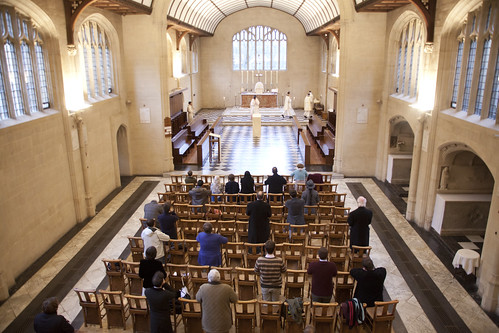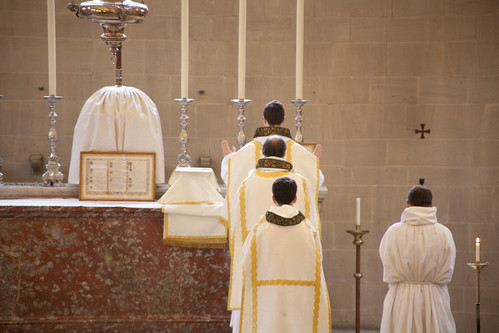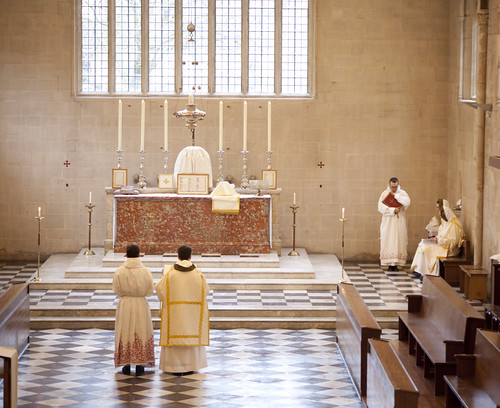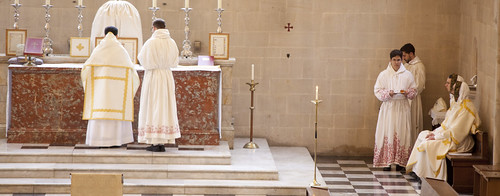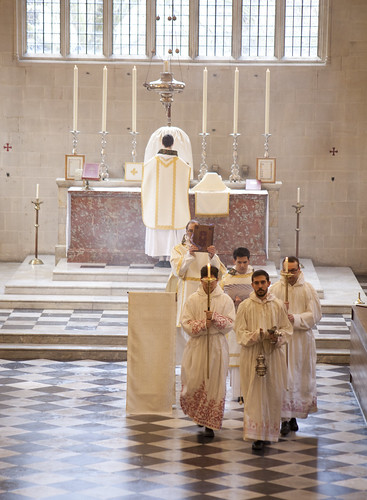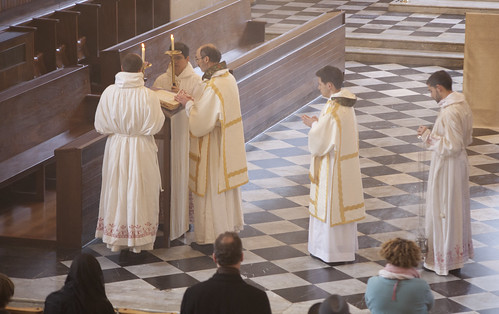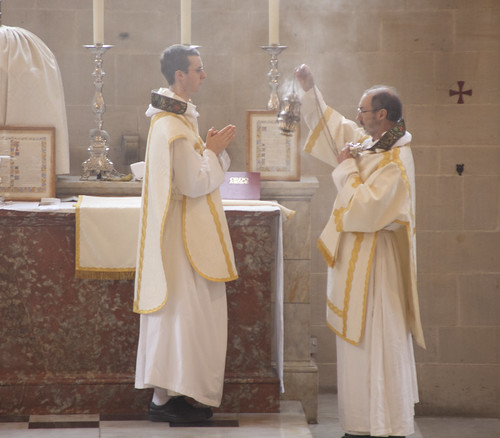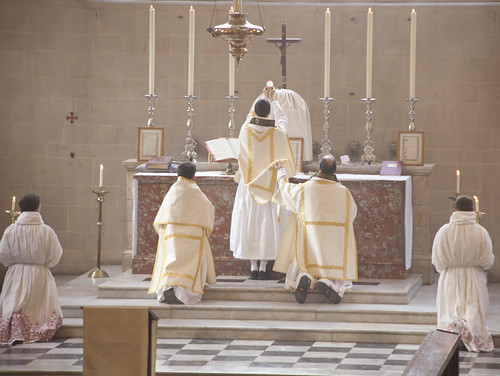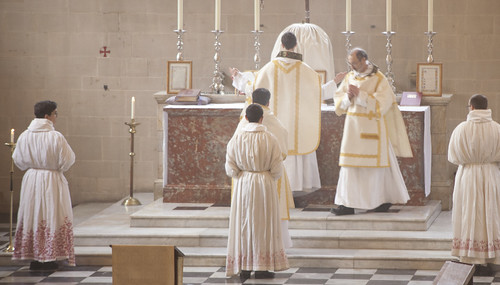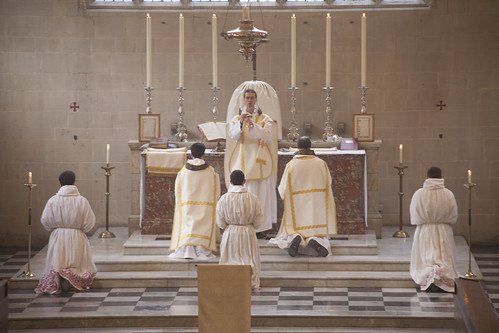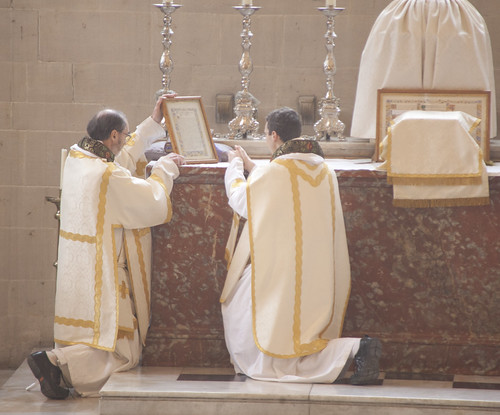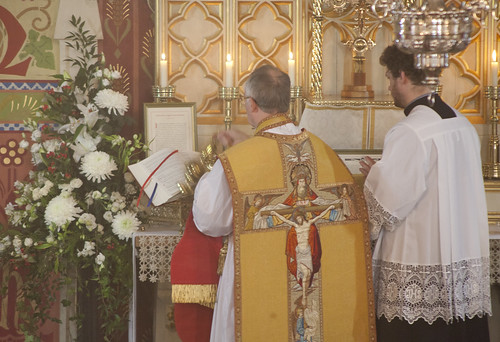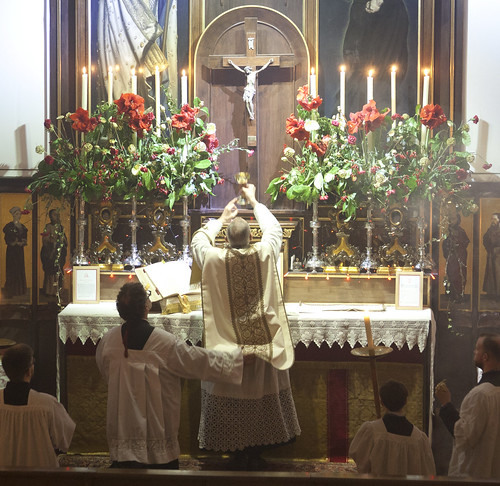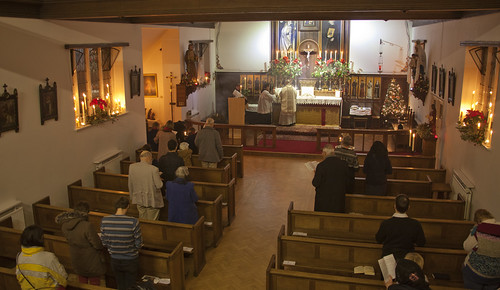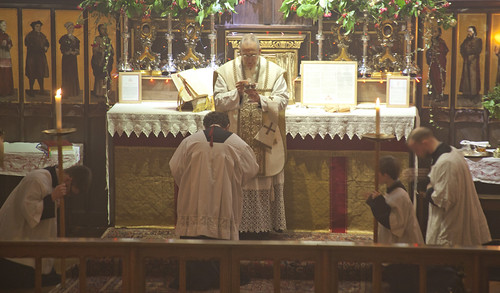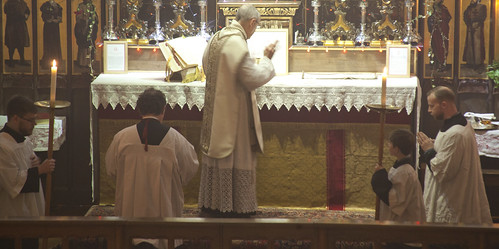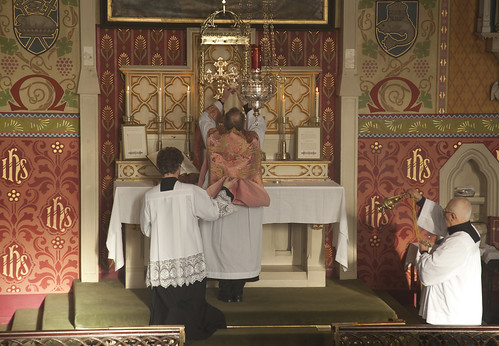Chairman's Blog
Malta sinks
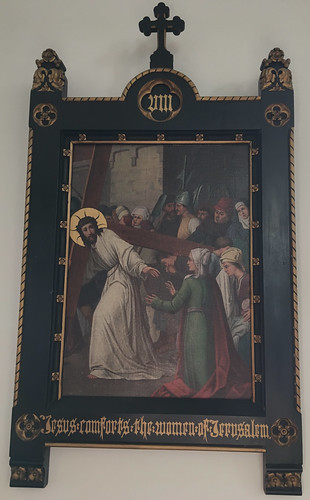 |
| 'Weep not for me, but for yourselves and for your children.' |
In World War II, Malta was described as the 'unsinkable aircraft carrier'. Well, it has sunk now. The Bishops of Malta (both of them) have stated that anyone in an irregular union who feels 'at peace with God' should not be excluded from Holy Communion or from Sacramental Absolution: at least, that's what they seem to say. Readers can judge for themselves.
If, as a result of the process of discernment, undertaken with “humility, discretion and love for the Church and her teaching, in a sincere search for God’s will and a desire to make a more perfect response to it” (AL 300), a separated or divorced person who is living in a new relationship manages, with an informed and enlightened conscience, to acknowledge and believe that he or she are at peace with God, he or she cannot be precluded from participating in the sacraments of Reconciliation and the Eucharist (see AL, notes 336 and 351).
Again:
there are complex situations where the choice of living “as brothers and sisters” becomes humanly impossible and give rise to greater harm (see AL, note 329).
If such a scene appears implausible, then we must admit that what the bishops are saying is simply: give absolution and Holy Communion to anyone who asks. Will we have a new Rite of Confession which makes the Act of Contrition optional? Or maybe a new Act of Contrition that leaves out the Contrition? It might look like this:
'O my God, because thou art so good, I am not at all sorry that I have offended thee, and with the help of thy grace I will offend thee again and again.'
To which the priest will respond:
'Go in peace, even though God has not put away your sins.'
Because, remember, this is not about people ignorant of the law, or about people whose actions are no longer moral actions at all because of an intolerable pressure which has destroyed their agency - not at all! - these are well-informed Catholics capable of sincere 'discernment' who are in happy second civil marriages which are sustaining loving homes for the children of these unions.
The only thing worse than the content of this document is the fact that it was published in the Vatican's official newspaper, L' Osservatore Romano.
The people telling the Four Cardinals that their dubia have already been answered now have another document to point to. But of course this is not an act of the Papal Magisterium, and in any case what we need to hear is how we are supposed to square this with things like the Council of Trent's infallible teaching that it is not impossible to obey God's law when in a state of grace. Austen Ivereigh and the others need to tell us, and the wretched clergy of Malta, why respect for the Magisterium places an ambiguous footnote in an Apostolic Exhortation, as interpreted by a couple of bishops, over a solemn anathema of a General Council.
The Magisterium of nods and winks is becoming more emphatic, and the crisis deepens, with more and more bishops, priests, and laity being thrown into the position of either going with the flow and participating in sacrilege, or resisting and becoming the target of not only the heavies in Rome but many of their own colleagues, superiors, and inferiors.
 But to cheer us up, there is a very interesting and helpful interview with Cardinal Caffara to read, and canonist Edward Peters brilliantly summarises the fundamental confusions and incoherences of the Maltese statement. The Catholic Herald report on the Maltese document, by Dan Hitchens, says everything I would want it to say.
But to cheer us up, there is a very interesting and helpful interview with Cardinal Caffara to read, and canonist Edward Peters brilliantly summarises the fundamental confusions and incoherences of the Maltese statement. The Catholic Herald report on the Maltese document, by Dan Hitchens, says everything I would want it to say.
This crisis is truly separating the men from the boys in the Church. We can either side with Christ, and his difficult, demanding, but also beautiful words on marriage and divorce, or side with the Pharisees and their modern-day successors, who search out specious casuistical exceptions to the rule until the rule is no more: who nullify God's will by the traditions of men.
Once you start noticing how people sometimes accuse their opponents of the specific faults which they fear they have themselves, you start seeing it everywhere...
Support the work of the LMS by becoming an 'Anniversary Supporter'.
Photos of High Mass in Blackfriars
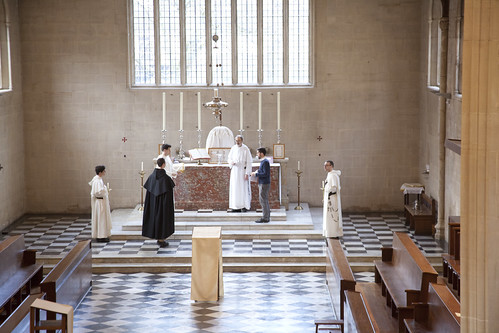 |
| Rehearsal. |
Yesterday the Oxford Dominicans celebrated a High Mass in their own, proper, rite, the ancient Dominican Rite, in honour of St Hilary of Poitiers.
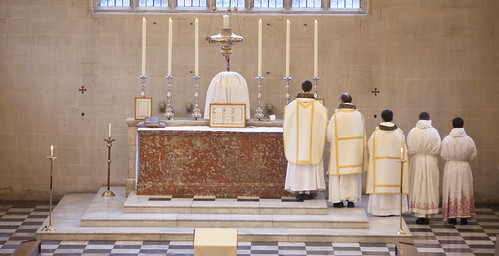 |
The Dominican Rite is different in a number of ways from from the Roman Rite, even though they share the same basic structure and most texts. The faithful will see the clergy doing things when in the Roman Rite they'd be waiting for singing to finish, between the Epistle and Gospel.
The Dominican Rite has its own chant book - Graduale - with chants mostly very clearly related to ones in the Roman Graduale, but with a number of differences both of text, melody, and style. It is very interesting to sing it, but it can be tricky for singers used to Roman chant. The Schola Abelis, who accompanied this Mass, did pretty well, under our excellent cantor Daniel Tate.
The Dominicans also have certain gestures of their own, their own way of handling the thurible, and no doubt all sorts of things I've not noticed.
It is wonderful to see this as High Mass, which is the normative form of any ancient liturgy, where the ceremonies are found in full.
The celebrant was Fr Matthew Jarvis, OP, with Fr Richard Conrad OP as Deacon, and Br Joseph Bailham, OP subdeacon. All are members of the Oxford community.
Fr Richard Conrad preached a very interesting sermon on St Hilary. There was a good congregation, despite limited publicity, with more than fifty people in attendance.
The Latin Mass Society promotes all legitimate ancient rites, and the Dominican Order neither reformed or suppressed their Rite, but simply decided to stop using it when the OF was promulgated. Today all Dominican priests have the right to celebrate it. (There exists a reformed version of the Carthusian Rite and, amazingly, of the Rite of Braga, but as I understand it the Carmelites and the Premonstrensians followed the example of the Dominicans and simply adopted the reformed Roman rite. So much for Vatican II's emphasis on variety.)
Support the work of the LMS by becoming an 'Anniversary Supporter'.
A footnote on Freemasonry
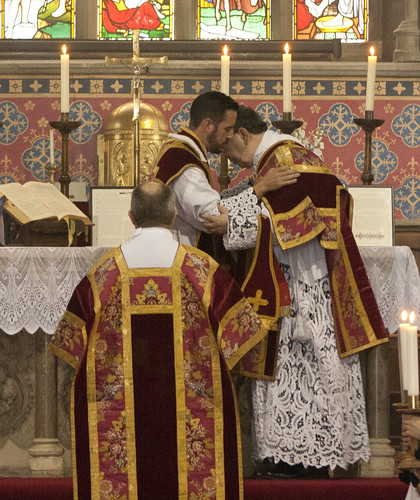 |
| One of my favourite liturigical rituals, and one of the most dramatic and expressive: the kiss of peace at High mass. |
Further to my post on Freemasonry here, a comment left on my FB page is worth reproducing, from a mason.
Most Freemasons of my acquaintance are traditionalists in the sense that they value and appreciate traditional values, especially morality, so might there not be scope for traditional Catholics and Freemasons to be allies in the fight against the advance of inappropriate modernism? We could still agree to disagree on details of doctrine (Freemasonry is not, and does not claim to be, a religion).
In light of the Church's condemnations, the prospect seems a dim one. Perhaps Freemasonry may be a promising field for evangelisation. However, my experience of people who regard themselves as guardians of 'traditional values' outside the Church is that there is usually a lot less to this than meets the eye. A classic position of liberal elites shoring up the established order is trying to stop people not-like-us reproducing: the poor, the stupid, members of less favoured ethnic groups. I wonder what masons think about issues like that. Maybe they'll tell me in the combox.
All the same, the last word should go to Walton Hannah.
In general, Freemasonry is Scotland is more popular and relatively far more numerous than in England, partly because it tends to be cheaper, and because austere Presbyterianism has eliminated most of the colour, glamour, and ceremonial from Christian worship. When the soul is starved of these elements in religion, it will naturally tend to compensate for them itself in less desirable ways. It is not only the hostility of Rome that has left Masonry weak in Catholic countries.
Darkness Visible pp257-8.
Support the work of the LMS by becoming an 'Anniversary Supporter'.
A note on Freemasonry
 Since Freemasonry is regarded as significant by Pope Francis, as well as many previous popes and in various private revelations by the Blessed Virgin Mary, I thought I'd try to educate myself a little about it. I can't say I've come to any very exciting conclusions, but I can recommend a couple of books, and make a few observations.
Since Freemasonry is regarded as significant by Pope Francis, as well as many previous popes and in various private revelations by the Blessed Virgin Mary, I thought I'd try to educate myself a little about it. I can't say I've come to any very exciting conclusions, but I can recommend a couple of books, and make a few observations.
My interest has been in the philosophy (or religion, or ideology) of Freemasonry, as opposed to the extent it has, or fails to have, influence in local or world events. The second subject is one where reliable information is obviously going to pretty difficult to find, and I think that Freemasonic influence over the Church, specifically, is going to be of importance only if it is connected with a philosophy which is opposed to the Church's teaching. Many dubious people have had undue influence over the Church locally, or in Rome, over the centuries, but if what they are after is money or prestige then the damage they do to the Church, while real, is at least comprehensible and repairable. The ultimate threat to the Church, against which Christ has given his ultimate guarantee, is not prelatial nephews spending the revenues of dioceses they never visit on wine, women and song, or criminal gangs arranging flamboyant funerals for deceased mobsters, disedifying though these are, but the Church ceasing to proclaim the Gospel because of the influence of an alien ideology.
So here are a couple of books. The classic study of British Freemasonry is Darkness Visible by Walton Hannah, first published in 1952. An excellent recent account is Masonry Unmasked by John Salza (2006), from an American perspective. The aim of each of these books is the same: to demonstrate, from the rituals used by Freemasons, that it has philosophical and religious claims which are incompatible with orthodox Christianity.
Hannah wrote his book as an Anglican cleric, at a time when several Anglican bishops were masons. They managed to prevent any official investigation or discussion of the subject, but the book's exposure of the issues brought a gradual end to the era of such close entanglement between Masonry and the Established Church. Nevertheless, Hannah later became a Catholic and a priest. Salza was a Catholic who became a mason after being told that there was nothing much wrong with it, for a Catholic; he found out more, as a mason, and realised that there was, and left it. Freemasonry is a religious system incompatible with Christianity; if most masons don't take this system very seriously, there is even less reason to commit oneself to it formally. As Hannah points out, the make-believe quality of the oaths and rituals, if that is going to be the defence, only serves to emphasise that in taking them one is guilty of the sin of rash swearing. But as a matter of fact there are masonic writers whose mystical interpretations of the rituals are the same of writers like Hannah and Salza.
The Masonic religio-philosophical system is, in a nutshell, that all religions are equally valid: members can swear their oaths on any holy text they like. Historically, the inspiration for the moral ideas and rituals comes from Christianity, with a bit of made-up ancient Egyptian mysticism. But Freemasonry also claims to have 'secrets' and a method of instruction which makes its members into an enlightened elite.
In this, Freemasonry is a fully-worked out example of Enlightenment liberalism, plus rituals, role-playing amateur dramatics, and silly handshakes. Liberals looks down at the world's religions and say, first, that they are all equally valid, and then, in the next breath, that they themselves have transcended such footling divisions. To say all religions are equally true is, of course, equivalent to saying that all are equally false, and it is not so surprising to find that the great division in the world of Freemasonry is between officially theistic masonry - the 'Grand Lodge' Masonry of the English-speaking world - and non-theistic and in practice anti-clerical masonry - the 'Grand Orient' Masonry of the Continent. The split occurred at the beginning of the 19th century, when the Grand Orient lodges rejected belief in God as an essential qualification for masons.
It is sometimes said by British masons that Catholic condemnations of Freemasonry refer to anti-clerical and historically anti-ancien regime Grand Orient masonry, not the kind which can happily include among its members British Kings and an Archbishop of Canterbury. However, as Hannah points out, this is not so, since many such condemnations date from before the split, and even later ones note religious indifferentism as a major issue, a criticism which ceases to be applicable when you tip over the edge into atheism. In fact the condemnations apply to both kinds, and to their many splinter-groups. It is enough to point out that they deny the unique significance of the Christian revelation, engage in unjust or at best rash swearing, and, despite official denials, seek to establish obligations which supersede those of Church and State.
Hannah gives a nice illustration of this. When looking into Freemasonry, he wrote, as an Anglican in orders, to bishops who where known to be masons, asking them for guidance as to how he should address the concerns of members of his flock about Freemasonry. They replied that they were not at liberty to discuss the matter. In other words, their masonic obligations took precedence over their episcopal obligation to provide guidance to those under their charge. This is the more remarkable in that the typical response of Anglican clerical masons to criticisms was to play down the reality of masonic obligations and the importance of the 'secrets': which had, after all, been published by masonic publishers, in easily decipherable code, for many years, accompanied by numerous exposes even before Hannah's supremely systematic and accurate one.
The situation is richly absurd, in that everyone can pore over masonic rituals, read masonic interpretations of them, and have a public debate on the subject, except the masons themselves, who, in Hannah's day and (I get the impression) today also, remain on the sidelines bleating feebly that it is all harmless fun but they can't go into details.
The question then is: when (for example) Our Lady of Good Success in Quito warns of the influence of masons, when Popes up to and including Pope Francis warn about 'Masonic lobbies', what exactly are we being warned against? It might seem unfair to point the finger at a dwindling British band of rather conservative, establishment types, who may give each other preferential treatment in dubious ways but hardly seem a threat to world peace. But actually, I think the fact that Anglicanism was riddled with Freemasonry at the eve of the great cultural and moral crisis of the 20th century does help explain why it collapsed so quickly and so completely: it didn't really believe in itself. Again, the fact that significant numbers of establishment types are still consoling themselves with 18th century allegorical morality tales of supreme superficiality, instead of either doing anything about public culture or availing themselves of the graces available from Our Lord and Saviour, helps explain why the 'small-c' conservative response to the continuing decay of this country is so consistently flaccid.
So I think the poison of religious indifferentism is at least part of what is being warned against. Today we see religious indifferentism raised to the level of a sort of official religion, in schools and in governments, both local and central. One may say that Freemasonry has triumphed, even if as an institution it has seen better days. If indifferentism, or indifferentism which has evolved into practical atheism, is a motive force for organised campaigning groups, whether these groups be derived from formal Freemasonry or not, one may, again, say that the spirit of Freemasonry is active in them. And indeed such groups exist within the Church, and it makes little difference whether they identify with Freemasonry or not: what matters is what they believe, and the effect they are having.
 It is obvious that you can't proclaim the Gospel unless you believe in it. If you think that the Gospel is no better than any other religion, and that you and your enlightened friends can look at all these belief systems from a great, patronising height, then you don't believe in the Gospel. To that extent that this attitude permeates the Church, the Freemasons have won.
It is obvious that you can't proclaim the Gospel unless you believe in it. If you think that the Gospel is no better than any other religion, and that you and your enlightened friends can look at all these belief systems from a great, patronising height, then you don't believe in the Gospel. To that extent that this attitude permeates the Church, the Freemasons have won.
Maybe it is actual, professed masons doing the bad things in the Church; if so, we'll probably never know. What we do know is how to oppose the errors of their ideology: with the truth of the Gospel.
Support the work of the LMS by becoming an 'Anniversary Supporter'.
Will Pope Francis come after the Traditional Mass?
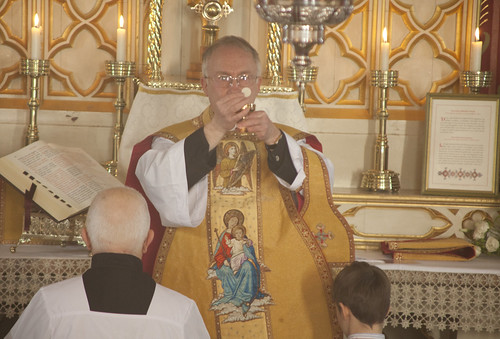 |
| A recent Missa Cantata in Holy Trinity, Hethe, in Oxfordshire. |
Having seen this story on Rorate Caeli and elsewhere, my own feeling, which I concede is very fallible and certainly isn't based on any very special intelligence gathered in Rome, is that Pope Francis isn't going suddenly to open up another front in the conflict he is currently engaged in. I don't see why that would make sense to him, at this point.
In brief, the story is that Archbishop Arthur Roche, formerly the bishop of Leeds in England and now the Secretary of the Congregation for Divine Worship under Cardinal Sarah, has been charged with working to undermine in some way what was one of the key documents of the conservative counter-offensive in Rome, which took place from the mid-1990s to the end of Pope Benedict's pontificate: Liturgiam authenticam, an Instruction of the Congregation for Divine Worship published in 2001. This document is about the principles which should inform liturgical translations, and it completely overturned the consensus which had governed the dreadful translations of the 1970s, by saying that liturgical texts should aim not only for easy comprehensibility, but for accuracy, plus an elevated style which evokes the idea that one is engaged in a holy action. (Take note, Neil Addison, who never tires of criticising the LMS translation of the Ordinary of the Mass for doing exactly this. That's the price of fidelity to the living magisterium I suppose.) Unusually, Liturgiam authenticam not only supercedes but explicitely abrogates earlier documents about translations, which did not say this (for a flavour of those, see this):
|
8. The norms set forth in this Instruction are to be substituted for all norms previously published on the matter, with the exception of the Instruction Varietates legitimae (1994) ...
|
Another factor is that Archbishop Roche was very much involved in the last English translation, and it would be a bit strange - not impossible, of course, people can change their minds - for him to set about destroying his own work.
And finally, Archbishop Roche is only the Secretary of the Congregation, and a new document against the Benedictine reforms, coming through the CDW, is hardly going to happen while Cardinal Sarah is in charge. Pope Francis could remove Sarah at any time, but up to now he has not done so, and whatever reasons he may have had for appointing him (quite recently, of course) seem still to be valid.
I am also sceptical about the idea that Pope Francis will go after the Traditional Mass after saying so often that he has no intention of doing so, and of making such concessions to the SSPX.
I think these sorts of stories come from people around Pope Francis who would like them to be true, perhaps even with a view to menacing potentially awkward people into quiescence. But the Pope has, in his confusing way, been quite consistent about his programme, and is now very deeply involved in the effort to make it work, against notable opposition. His programme is about making concessions, whether rhetorical or substantive, to divorcees and others living on the margins of the Church. He has never shown any great interest in the liturgy, and celebrates ad orientem as well as versus populum in the Sistine Chapel.
Nevertheless, it is never a bad time to think about what we can do to be ready for any attack on the Traditional liturgy. One thing I have been doing with the Position Papers is trying to show how that liturgy can be of real value to the Church, in the proclamation of the Gospel in Africa, in China, to men, and to children. The list is not going to stop there. This is one way to counter the idea that the Traditional Mass can or should be confined to any kind of ghetto.
Support the work of the LMS by becoming an 'Anniversary Supporter'.
Epiphany in Oxford: photos
The celebrant was Fr John Saward, Priest in Charge at SS Gregory & Augustine's. We always have candles all round the church for Epiphany.
The Schola Abelis was led by Dominic Bevan.
Support the work of the LMS by becoming an 'Anniversary Supporter'.
Mass for St Hilary in the Dominican Rite, Oxford: 14th Jan
The Schola Abelis will be learning to sing the Dominican chants for the feast, which are slightly different from those in the Roman books. The Dominicans want to celebrate this as a High Mass, with deacon and subdeacon, so it will be a splendid Mass. If you can make it, please come along to honour the great St Hilary, who has given his name to Oxford's spring term, the term which starts on the very next day.
Support the work of the LMS by becoming an 'Anniversary Supporter'.
2017 Wall Calendars still available from the LMS
Now that you've remembered that you forgot to get one of these, you still can! Yours for £7 from the LMS website here.
It opens up to a list of dates arranged vertically, giving you much more space than in the usual formats to write things in, with our lovely photos arranged down the left.
Support the work of the LMS by becoming an 'Anniversary Supporter'.
LMS vs. CTS Ordinary Booklet: the translation
The Catholic Truth Society boasts that the translation they include in their booklet of the Ordinary of the Mass is a newly commissioned one. This is a good thing, for many translations in old hand missals are not very good - surprisingly enough, from the era when a good number of Catholics would have had the Latin to notice errors and infelicities, at least so one would imagine.
I think it would be a good thing if Catholics could get into serious discussions about the meaning of Latin words, so I am going to do a little digging. The CTS translation is not too dreadful, but - obviously - the LMS one is far superior. (Buy it from the LMS website.)
There are certain words and passages which can serve as a litmus test of liturgical translations. Does it translate 'hostia' as 'host', or 'sacrifice', or correctly, as 'victim'? Does it refer to Abraham as a Father or Patriarch, as the Latin does, or find some mealy-mouthed substitute? Does it cut out the poetic adjectives which adorn the Institution Narrative: accipiens et hunc praeclarem calicum in sanctas ac venerabiles manus suas?
I am happy to say that the CTS translation passes these tests: 'old ICEL' (1974) did not. ('He took the cup.' Words fail me.)
It is at a slightly more subtle level that the CTS translation is deficient: and I am afraid the deficiency is a real one. It is evident to me, not a great Latinist by any means, but, like many Catholics, someone who can look from the Latin page to the English one and see what is being translated, that the translation is just consistently, well, a bit lame.
How do you translate that amazing word, tabernaculum? It was 'tabernacles' which St Peter proposed to build on the mountain of the transfiguration, and translators have rendered it as 'booths' and 'tents', but clearly this is a word freighted with significance. It is tabernacles which feature in the Feast of Tabernacles: 'Feast of Tents' hardly captures the idea. And the word and the concept have been adopted for the dwelling of Our Lord in the Blessed Sacrament in our churches. It appears in the Psalm Judica: 'unto thy Holy Mountain and unto thy Tabernacles'. The CTS gives 'tents'. Lame. The LMS has 'tabernacles'.
What of the Canon? Prayer for the living: pro se suisque omnibus: literally, 'for them and for all their own', the LMS conveys the sense with 'for themselves and all who are dear to them'; the CTS has 'for themselves, for their families and friends'. As well as suggesting that the Latin says things it simply does not say, don't you think this lacks dignity? It is lame.
What of the 'locum refrigerii', which we pray for, for the dead? The LMS captures the idea, born in hot countries no doubt, of the cool and quiet of heaven, with 'place of refreshment'. The CTS has 'a place of respite.' Seriously lame.
How about 'Hanc igitur oblationem'? The LMS gives us 'this oblation'; the CTS 'this offering'. Now that is really lame. An oblation is more than just an offering. It always reminds of me of Martin Luther saying that the Canon 'stinks of oblation'. Well, the CTS version doesn't: at least, not so powerfully.
It ought to smell to high heaven: like at the Offertory, where the CTS tells us that it should 'rise up with a pleasing fragrance before your divine majesty'. But the LMS has 'ascend in the sight of thy divine majesty with an odour of sweetness.' Who could not prefer the LMS version, especially when it is evident that it is closer to the Latin? The CTS just gives up the unequal struggle to find a translation of 'in conspectu divinae maiestatis tuae.'
The fact is that the Latin is flowery. If you don't like it, find some other religion: these are among the most ancient liturgical texts which exist in the Church. It is flowery, repetitive, poetic, and larded with foreign, exotic, and archaic vocabulary (by the standards of its own day). It needs to be translated in a way which is faithful to these realities. That is why the LMS has used 'thee' and 'thou', which the CTS has not had the courage to embrace, which are rather less archaic to us than 'quaesumus' was to Romans in the 4th century.
Translating is difficult, and I don't want to be too harsh on the anonymous translator who struggled over these texts for the CTS. I am sure he was poorly paid. But readers of this blog can do better. They can buy themselves the LMS booklet. It can be purchased from the LMS website.
Support the work of the LMS by becoming an 'Anniversary Supporter'.
EF Ordinary Booklet: LMS vs. CTS
 |
| Ever mindful of feedback, we will be using this slightly revised, less cluttered cover when the booklet is reprinted. The contents will also have some tiny, and I mean tiny, corrections. |
One of the reasons we at the Latin Mass Society created a booklet of the Ordinary of the Mass was because the widely-used red 'Booklet Missal' produced by the Coalition in Support of Ecclesia Dei is American and contains some American feasures, such as the American version of the Prayer to St Michael. We also thought we could do better in certain ways.
While we were still thinking about this, the Catholic Truth Society brought one out. That is a good thing; it is good that the the CTS is using its considerable market penetration to spread knowledge about the Traditional Mass, in a handy pocket format with a smart leatherette cover. The only problem is that this booklet contains a series of mistakes.
A second edition was published, and I thought they might address some of these, but in fact the only difference, as far as I can see, is the title: it is now called 'The Extraordinary Form of the Mass' instead of 'The Traditional Latin Mass'.
So what are these mistakes?
First, there are a series of misdirections as to who is saying what.
At the Pater Noster (the Our Father, before Communion) it directs 'S', the server, to say the it up to and including 'et ne nos inducas in tentationem', when it says 'S/C' (Server or Choir) to say 'Sed libera nos a malo', adding 'This is sung at High Mass'.
This makes no sense at all. The Pater Noster is never said by the Server, but the Server (or the choir) responds 'Sed libera nos a malo'.
 |
| Some bright spark at the CTS objected to their title 'The Traditional Latin Mass'. Fine, but what about the mistakes? |
It is true that there is an obscure option for the congregation to say or sing the Pater Noster, among the many complicated options for dialogue Masses given in 1958. But the point of this, of course, is that it is said by the congregation, not the Server. Directing the Server to say it is simply wrong. And anyway, the CTS booklet hasn't gone into all the other complicated options, which are never used in England. I suspect the confusion here has come from practice at the Novus Ordo.
A different kind of confusion is at work in the Agnus Dei, where the book tells us that it is
 |
| One of the illustrations in the LMS book. |
One of the strangest things in the booklet is that it tells us that 'Prayer for the Dead is sometimes added' to the Prayers after Low Mass, giving the text of the De Profundis. I have never encountered this, and it is not in the Ritus Servandus. If it is done, it would be a private initiative of the priest. It is extremely strange to print it in a tiny book to help people follow Mass.
 |
| Another illustration. |
The Latin Mass Society's booklet has a huge amount of additional material, including beautifully printed chant notation and prayers for Holy Communion, and it can be purchased from the LMS website (or your friendly local church) for the extremely reasonable £3.75, with a stiff colour cover. There are discounts for bulk orders.
The leatherette CTS booklet will set you back £5.95; they also do a version in the format of one of their information booklets, for £2.50, but if you want something small and cheap, you can get one of the little blue booklets from the LMS for £1.50.
Support the work of the LMS by becoming an 'Anniversary Supporter'.

